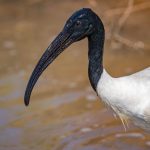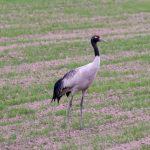Monk Parakeets appear to be winning the war declared on them in West Haven several years ago by United Illuminating, which seeks to stop the birds nesting on utility poles. The company no longer catches the birds to euthanize them, but is finding it impossible to discourage the birds (they like the warmth of electrical transformers). The New York Times has an article.
Recent Posts
 Birding Lodges Of the World: Paradise in PortugalBy Editor
Birding Lodges Of the World: Paradise in PortugalBy Editor Birding Yala National Park, Sri LankaBy Kai Pflug
Birding Yala National Park, Sri LankaBy Kai Pflug Birding between the fences – Qinghai and Gansu, Summer 2025 Part 2By a Guest
Birding between the fences – Qinghai and Gansu, Summer 2025 Part 2By a Guest The Chemistry of Birds (4): EggshellsBy Kai Pflug
The Chemistry of Birds (4): EggshellsBy Kai Pflug Three Photos: EcuadorBy Editor
Three Photos: EcuadorBy Editor Missing the Gray-headed ChickadeeBy a Guest
Missing the Gray-headed ChickadeeBy a Guest A Birder Reads a Scientific PaperBy Jason Crotty
A Birder Reads a Scientific PaperBy Jason Crotty
Welcome to 10,000 Birds!
Learn about our site and writers, advertise, subscribe, or contact us. New writers welcome – details here!
Posting Calendar
| DAY | WRITER(S) | SERIES |
|---|---|---|
| MON | Kai (w) | Birding Lodges (w) |
| TUE | Donna (m) Susan (m) Hannah (m) Fitzroy (m) | Bird Guides (w) |
| WED | Leslie (bw) Faraaz (bw) | Ask a Birder (w) |
| THU | Paul (w) | Birder’s Lists (w) |
| FRI | David (w) | Species Spotlight (w) |
| SAT | Peter (bw) Luca (bw) | From the Archives (w) |
| SUN | Clive (w) | Three Photos (w) |
| w weekly, bw biweekly, m monthly | ||
| Any time: Jason, Mark, John, Sara, Rolf, Dragan | ||
See here for info on the writers.
Newsletter
Signup and receive notice of new posts!
Thank you!
You have successfully joined our subscriber list.











I was initially interested to see a few pairs of the Monk Parakeets in my area on Galveston Bay, Texas about twenty-five years ago. As the years went on one fancier in San Leon fed them each day and they built a colony nest in his palm tree. They built more nests in the high voltage electrical transmission supports up and down the highway, with several people still subsidizing their feeding.
Those things beat me to my fig trees most days and I’ve seen them play havoc with pear trees by a flock taking a few bites out of each pear on a tree. We witnessed a flock of them chasing a Mockingbird and found its remains later where they’d chased it down and eaten it. They’re considered a destructive pest in their native habitat and I expect them to become one here.
@Bird Advocate: I sincerely doubt that the Monk Parakeets were responsible for eating a mockingbird. And, so far as I know, in their native habitat, they are not considered pests…but when humans move in and change the native habitat by converting it to agriculture, well, one can’t blame the parakeets for eating some of the product.
‘Bird Advocate’? Just what are you advocating with an attitude like that? Strange name to take for someone who so clearly misunderstands birds…
I clearly misunderstand birds? I have been interested in them and observed them all my life, and in every country I’ve visited. I have owned, bred, and raised thousands of birds of most varieties of exotics, large and small, and rehabilitated native birds and animals in the United States for decades.
Perhaps I’ve come to the wrong place. I had friends here once, and there are other birders who used to visit here who may remember me. I witnessed what I posted about the Mockingbird being killed in our pasture, as my wife at the time did.
There was also a red tailed hawk who’d hunted that pasture for years. We saw the entire colony of Monk Parakeets chase it from the area a number of times, though they seemed very careful not to fly too close.
We also witnessed the aftermath of a caged pair of smaller Plum head hook-bills we owned who killed and ate a small rat, turning the pelt inside out as they ate it, down to the toes. Anyone doubting a hook bill will eat meat should have seen a Mexican Red head Amazon we hand raised from an egg splinter a roasted chicken bone to eat the marrow. In short, do and think as you will, but do not doubt I am a skilled observer and a truthful one.
“‘Bird Advocate’? Just what are you advocating with an attitude like that? Strange name to take for someone who so clearly misunderstands birds…”
Instead of jumping to conclusions take a few seconds and click on the name “Bird Advocate” or Google it. It will direct you to my blog either way.